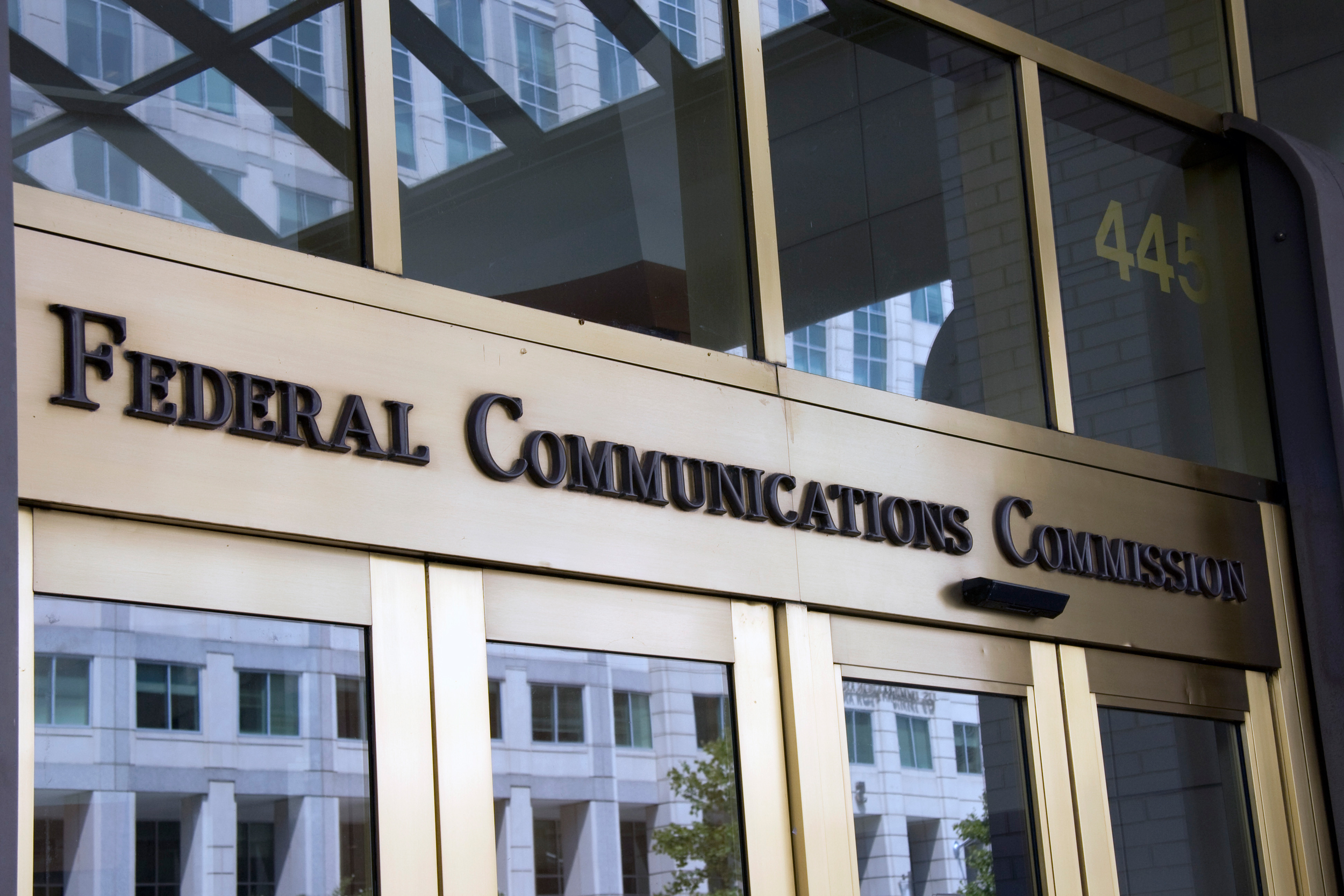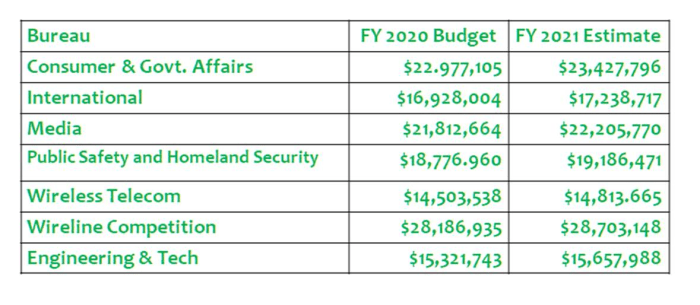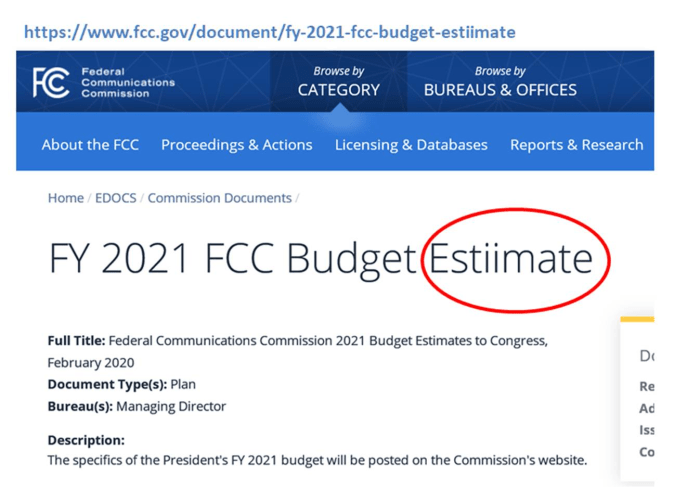FCC 2021 Budget Plan of $482 Million Built Around Spectrum Plans

The smarter way to stay on top of broadcasting and cable industry. Sign up below
You are now subscribed
Your newsletter sign-up was successful
The Federal Communications Commission said it needs $481.59 million to conduct its operations next year, up just 0.3% from the current fiscal year and reflecting an expected boost in revenue from spectrum auction fees. Among the notable lines items in the Fiscal Year 2021 budget plan that the FCC unveiled on Monday (Feb. 10) was a $134.5 million request for spectrum auction authority, an increase of nearly $2 million (about 1.5%) from the current year.
The FCC's 2021 budget request coinciding with the release of the White House's $4.8 trillion proposal to Congress for next year's spending plan. The Administration's plan includes increased funding at Commerce Department agencies to accelerate 5G and Artificial Intelligence.
As part of its budget proposal, the FCC listed four "strategic goals for 2021," starting with objectives for "Closing the Digital Divide" and "Promoting Innovation." Its goals also include "Protecting Consumers and Public Safety" and "Reforming the FCC’s Processes", which it defines as efforts to "modernize and streamline the [agency's] operations and programs."
Overall, the FCC said it will conduct its business with the same staffing level (1,448 people) that it currently employs. It broke out its proposed budget levels for major bureaus and operations as follows:

As for its primary strategic goal (closing the digital divide), the FCC said it will "develop a regulatory environment to encourage the private sector to build, maintain, and upgrade next-generation networks so that the benefits of advanced communications services are available to all Americans." It vowed to "employ effective and efficient means to facilitate deployment and access to affordable broadband" where the business case for infrastructure investment doesn’t exist."
Counting On Auction Revenue
The Commission pointed out that its to-date auction program "has generated over $117 billion for government use" at a cost of "less than $2.1 billion or 1.7% of the total auctions' revenue."
The smarter way to stay on top of broadcasting and cable industry. Sign up below
The budget plan cited the Trump Administration's legislative agenda items "that pertain to the FCC" and "are designed to improve spectrum management and represent sound economic policy." In particular, it points to plans for "new authority to use other economic mechanisms, such as fees, as a spectrum management tool."
"The FCC would be authorized to set user fees on unauctioned commercial spectrum licenses based on spectrum-management principles," according to the 163-page FCC budget document. "Fees would be phased in over time as part of an ongoing rulemaking process to determine the appropriate application and level for fees. Fee collections are estimated to begin in 2021 and total $4.0 billion through 2030."
The Commission explained that it needs funding at the requested levels "to continue post-broadcast incentive auction (BIA) work related to repacking and reimbursing broadcasters and MVPDs [multichannel video programming distributors] for their relocation costs to implement the results of the BIA, as well as expand that program to include new requirements included in the Reimbursement Expansion Act."
It also said that the funding level will "improve its auctions program infrastructure in preparation for future auctions" and thus help it to conduct additional auctions to make more spectrum available for next-generation wireless services." It also cited the need to implement RAY BAUM'S Act (Repack Airwaves Yielding Better Access for Users of Modern Services) of 2018, which will make more spectrum available for mobile and fixed wireless broadband.

Preparing for HQ Move
The FCC confirmed that it intends to move to new headquarters at 45 L Street NE (north of Capitol Hill) in June of this year, as authorized in previous budgets. The cost of the move (about $68 million) will come from "both regulatory fees and auctions program funds."
5G Looms Large in Commerce Department Agenda
Separately, the Department of Commerce section of the White House budget plan singles out the National Telecommunications and Information Administration, allotting it $25 million "to modernize spectrum management systems," and thus enable the U.S. "to more efficiently satisfy industry's need for additional spectrum and preparing the nation to transition to 5G."
NTIA's sister agency within DoC, the National Institute of Standards and Technology (NIST) will be allotted $718 million "to advance U.S. innovation and technological development" as part of an "all-of Government approach" to establish U.S. leadership in next generation communications (especially fifth generation 5G) wireless, artificial intelligence and advanced manufacturing. This sum doubles NIST's prior AI funding "in order to accelerate the development and adoption of AI technologies."
Contributor Gary Arlen is known for his insights into the convergence of media, telecom, content and technology. Gary was founder/editor/publisher of Interactivity Report, TeleServices Report and other influential newsletters; he was the longtime “curmudgeon” columnist for Multichannel News as well as a regular contributor to AdMap, Washington Technology and Telecommunications Reports. He writes regularly about trends and media/marketing for the Consumer Technology Association's i3 magazine plus several blogs. Gary has taught media-focused courses on the adjunct faculties at George Mason University and American University and has guest-lectured at MIT, Harvard, UCLA, University of Southern California and Northwestern University and at countless media, marketing and technology industry events. As President of Arlen Communications LLC, he has provided analyses about the development of applications and services for entertainment, marketing and e-commerce.

